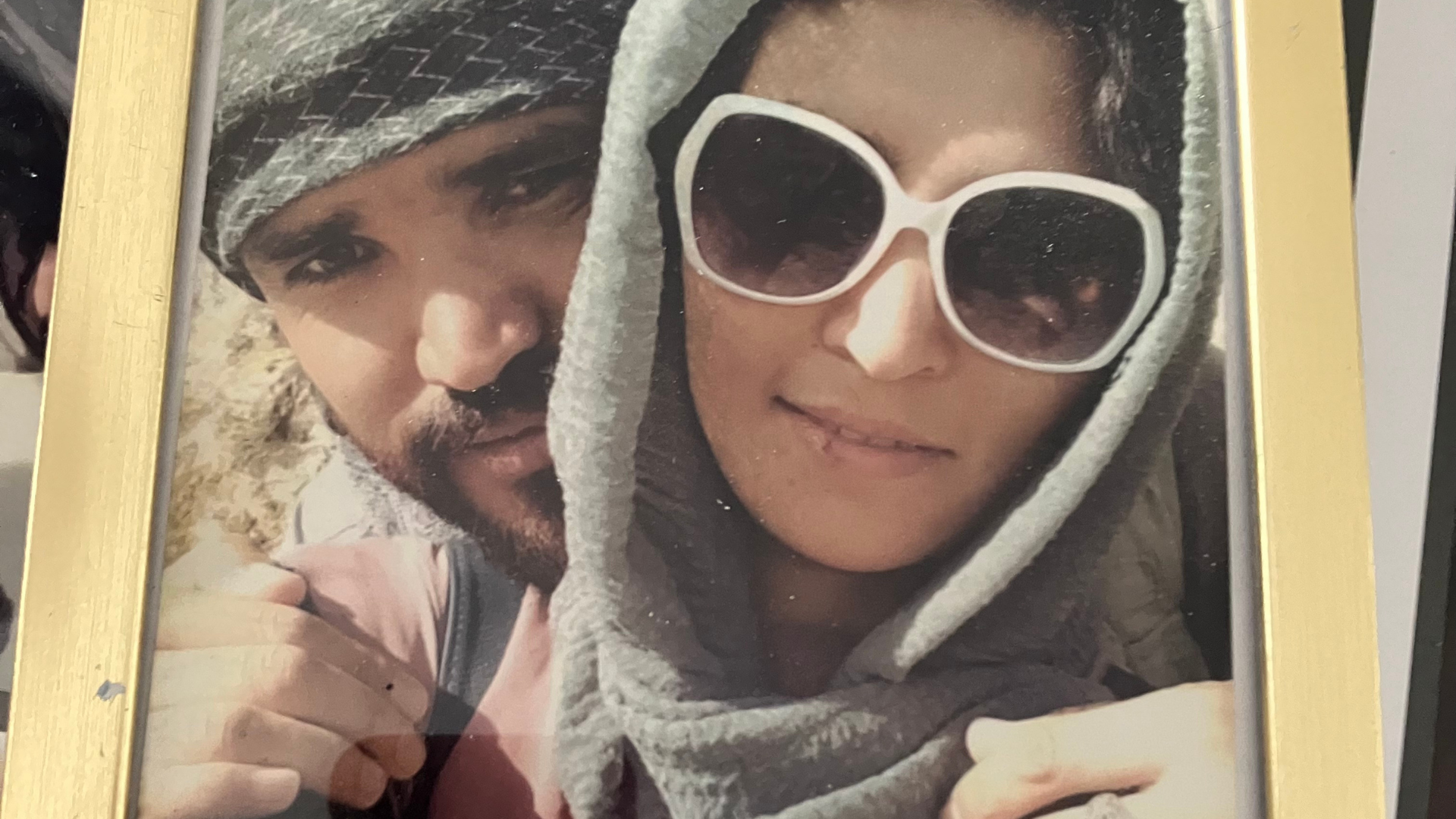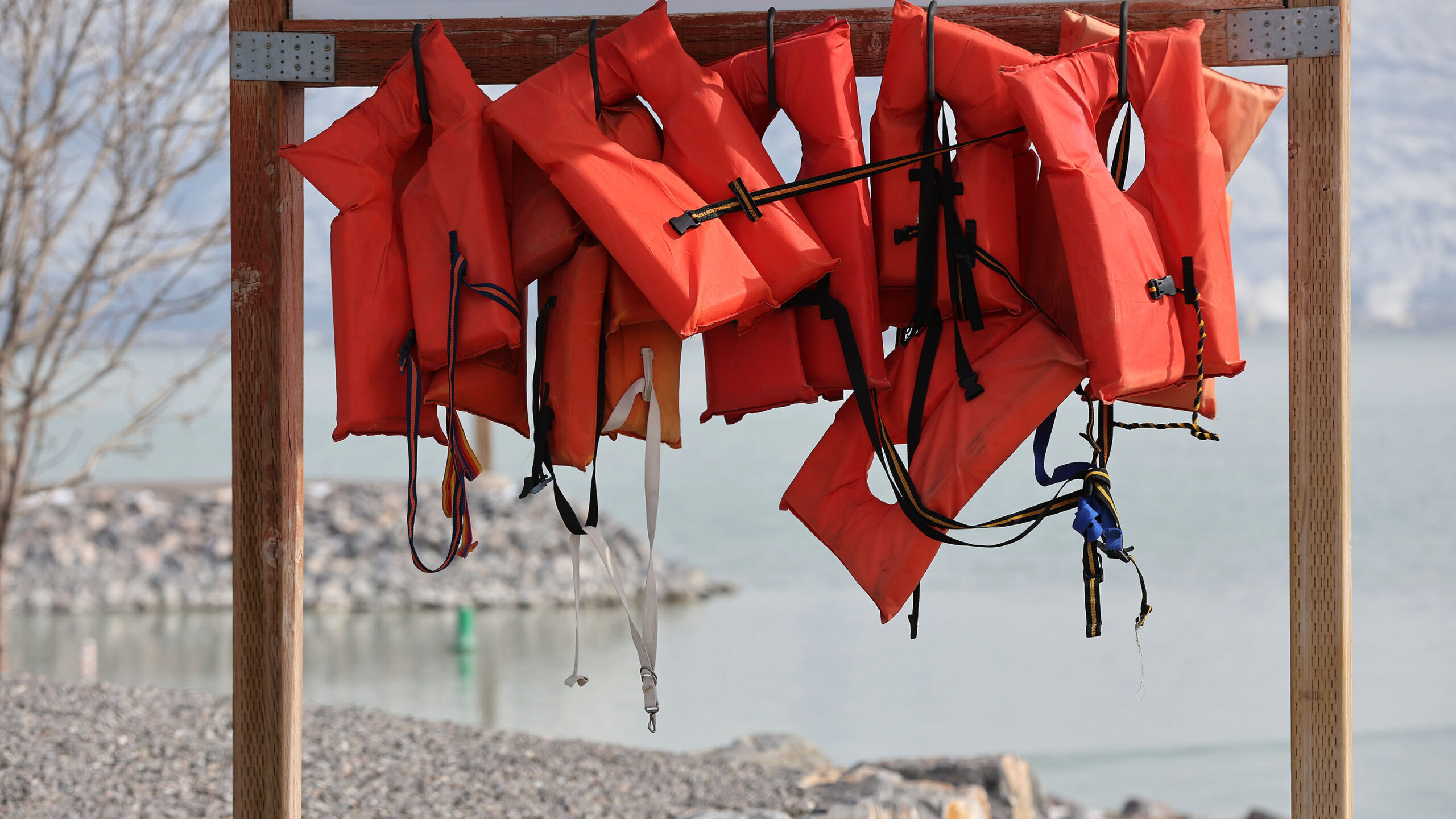‘Stranger Becomes Neighbor’: Afghan soldier navigates new life in Utah with help from afar
Aug 22, 2023, 6:30 PM | Updated: Aug 23, 2023, 11:11 am

Sima travels with this framed photo of herself with her husband who died while on military duty during Afghan elections in 2019. She is one of 43 Afghan women from the Afghan Army's Female Tactical Platoon now living in the U.S. (Andrea Smardon, KSL Podcasts)
(Andrea Smardon, KSL Podcasts)
SALT LAKE CITY — When the taxi abruptly stopped in traffic, the 25-year-old woman tried not to look at the heavily armed Taliban soldier who approached the passenger window of the car they prayed would carry them to a new life.
As the soldier questioned her 18-year-old nephew, she kept her gaze down, only sneaking a nervous glance at her mother and toddler son, who were squeezed into the backseat of the taxi next to her. She was terrified they wouldn’t make it to the Kabul International Airport by sunrise, terrified they’d miss their flight to safety, and terrified that if these men figured out who she was, they’d all pay a brutal price for her choices.
Who was she?
This woman, whose face was partially concealed with a head scarf, was an elite soldier working with the U.S. Army’s Special Forces. Raised in a country where women and girls risk being killed just for going to school, she was a special operator who rappelled out of helicopters, carried an M4 carbine, and actively fought to undermine the Taliban.
As the U.S. withdrew the last of its military forces in August of 2021, this woman, and thousands like her, had no choice but to abandon their homes or risk prison or death for helping the Americans during the two-decade war.
Her name is Sima. She does not use her last name because she fears what the Taliban might do to the members of her family who still live in Afghanistan. She proudly served in the Afghan Army for six years, part of an elite unit called the Female Tactical Platoon that assisted on combat missions and night raids with the U.S. Army Special Forces, though she kept it a secret — even from her friends and neighbors. Her husband, who also worked in the military with Americans, was killed by an explosive device while on duty during the Afghan elections in 2019. He never met their son.

Sima, a member of the Female Tactical Platoon, poses for a photo in full combat gear (Photo: Sima)
Sima endured several days of tear gas, guns fired in the air, and crushing crowds at the Kabul airport, but when she finally boarded the plane that would take her and her son to safety, she felt only loss.
“When I left Afghanistan, I was very sad, unlike many who were happy,” Sima said through a translator. She fought for a better country. She did not want to abandon it.
Sima is one of 43 Afghan women from the Female Tactical Platoon now living among us in the U.S. But as the podcast “Stranger Becomes Neighbor” uncovers, getting on that plane two years ago wasn’t the end of her struggle.
Help from afar
When a caseworker dropped off Sima, her nephew, and her son at a hotel room, the hotel was on the edge of a strip mall in a suburb of Salt Lake City, it was late at night, and they were hungry. They weren’t sure where they could find food. But then, there was a knock on the door and a man handed them a meal cooked by a nearby Indian restaurant. Someone was looking out for Sima from afar.
That person was a 27-year-old woman in Georgia, Becca Moss. She was 2,000 miles away, but the two women had been texting and she knew Sima could use some nourishment, so she placed the order for Indian food.
Moss had worked with Sima in Kabul, training new Afghan recruits. She was a member of the Cultural Support Team, an army unit of American women who worked closely with their Afghan counterparts from the Female Tactical Platoon and U.S. Special Forces.
“The military is a family, no matter how you spin it,” Moss said. “They serve side by side doing the same things.”
When the Afghan women first arrived in the U.S., Moss and her other Cultural Support Team comrades formed an organization called Sisters of Service. Their mission was to help their fellow soldiers rebuild their lives in America. Knowing everything that Sima had sacrificed to serve alongside the U.S. military, Moss felt a responsibility to make sure that she felt supported.
I think we owe them a lot. “These women literally are an anomaly. They’re from Afghanistan, against all odds, joined the military, joined the Special Forces, and then fought for their freedom alongside U.S. soldiers, which is more than 99% of Americans can say. I think they’ve sacrificed a lot more for America than most Americans.” -Becca Moss, Sisters of Service
But Moss wasn’t sure if she could meet Sima’s needs from so far away.
“It was a little bit of a concern because I knew nothing,” Moss said. “I know there’s a lot of Mormons out there. That’s all I know about Salt Lake City!”
“I’m her friend,” she told Sima’s case worker. She immediately contacted the resettlement agency responsible for Sima. “I’m just trying to make sure she’s OK. I’m not gonna leave you alone, so you might as well accept that I’m gonna be in your life.”
Enlisting local volunteers
Moss found a woman living in Salt Lake City who volunteered to babysit Sima’s son. This made it possible for her to attend English classes. Another local volunteer also helped her move into an apartment. They helped furnish it, find rugs, and buy her shoes for the winter.
With the community’s support, Sima enrolled her son in daycare and got her driver’s permit. She started working part-time as a cashier at Walmart. However, she worried about when government funds would stop paying her rent.
“I’m worried about how to survive with that money that I’m making,” Sima said through a translator as she began to cry. She did not make enough money to pay her expenses. She couldn’t send money home to her family in Afghanistan. They were living in hiding from the Taliban because of Sima’s alliance with Americans.

Sima makes a meal for Becca Moss of Sisters of Service when Moss visits Salt Lake City. (Photo: Becca Moss)
On top of her financial concerns, she also worried about her legal status in the U.S. Like most of the Afghans who evacuated in a rush in 2021, she arrived as a humanitarian parolee. This temporary status allowed her to legally live in the U.S. for two years. She did not know what her future would hold if she weren’t granted asylum within that time.
Help among communities
She said it helps to talk with some of her new friends in the community. Additionally, she found help by talking with members of the Sisters of Service, who understand what she’s going through.
“They don’t want to be a charity case,” Moss said. “They want to be a strong individual like they were in Afghanistan.”
Moss and the Sisters of Service have refused to leave anyone behind. Staying true to the principles they internalized in the U.S. military. Everything they’ve done for their Afghan sisters has been voluntary, outside their regular jobs and life responsibilities. There are limits to what they can do, and they’ve learned from experience that they have to spread the weight if they’re going to be able to continue. They alone cannot provide all the elements of a community.
“I think it’s really sad to see people not have enough resources initially, but the community has been really great,” Moss said, speaking about Sima’s new friends in Utah. “That’s what people need is somebody who’s consistently showing up in their life.”
Over the course of two years, Sima shares her struggle to make a life in the U.S. in the podcast “Stranger Becomes Neighbor.” The evacuation from Afghanistan is just the beginning of a story that continues to develop. To this day, Sima’s status in the United States remains uncertain.
How you can help
Visit Hope4Afghanistan to learn about helping Afghans in need in these key areas: education (especially for women), healthcare, gender equality, community development, and youth programs.
Here’s how American female veterans at Sisters of Service are helping to resettle and empower the Afghan women who fought by their sides.
The PedFed Foundation offers assistance specifically to Afghan women and their families through its Afghan Rescue and Resettlement program.
Season 1: “Afghan Arrivals” is available at StrangerBecomesNeighbor.com or wherever you listen to podcasts. New episodes are published every Tuesday.
Related reading
‘Stranger Becomes Neighbor’: Separated from parents, Afghan refugees land in Utah in the dark (find more about this podcast here)













